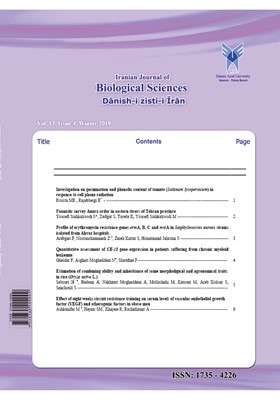Investigation on germination and phenolic content of tomato (Solanum lycopersicum) in response to cell phone radiation
Subject Areas : Plant Biology
Elham Rajabbeigi
1
*
![]() ,
Mohammadreza Rousta
2
,
Mohammadreza Rousta
2
1 - Faculty of advance science and technology, tehran medical sciences, Islamic Azad university
2 - Department of Biochemistry-Biophysics, Faculty of Advance Science and Technology, Tehran Medical Sciences, Islamic Azad University, Tehran, Iran
Keywords: germination, phenolics, Cell phone radiation, Tomato (Solanum lycopersicum),
Abstract :
Nowadays, the use of cell phone has increased with the modernization. It has led to the increase in the radiations in the environment which further has effect on the plants and animals including human beings. In this research, the grains of tomato (Solanum lycopersicum) were placed in petridish and the mobile phone set was placed over them and it was activated by calling from another phone. The grains under the treatment for 14 days, were radiated for 10 minutes every day. After the treatment, the effects of cell phone waves on tomato (Solanum lycopersicum) seedlings were investigated and the percentage of germination, radical scavengering capacity, and phenolics were examined in compared to control samples. It was observed that radiations emitted from cell phone show considerable increasing in the germination percentage and lipid peroxidation. Radical scavenging activity (RSA) and protein content were declined in response to cell phone radiations. Increasing of seed germination could be caused by inducing gene expression in response to cell phone radiations. It seems that although the decrease in radical scavenging activity, ROS was increased. It could be led to lipid degradation in compare to control ones. Total phenolics decreased in response to phone radiation. It seems that cell phone radiation can affect cells through the membrane degeneration and the production of reactive oxygen species.
_||_

